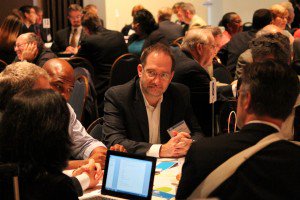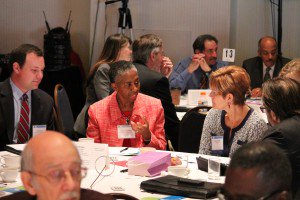On September 27 many of metropolitan Washington’s elected officials business leaders and regional planners got together for a frank conversation about the future of the region’s economy. The full-day dialogue – called “Economy Forward: Shaping the Future of the Region” – was helped by the use of computers and voting key pads to guide the participants as they discussed transportation and land-use needs in localities from Frederick MD to Prince William VA.
This gathering of leaders focused on COG’s plan for regional prosperity Economy Forward. The metropolitan Washington region has the nation’s most educated workforce an increasingly diverse economy and has seen an ongoing revitalization of urban centers. The Council of Governments and its stakeholders want to build on this momentum by solidifying regional partnerships that will support the next big steps needed for regional transit and transportation plans and also for Activity Centers – the region’s downtowns that combine residential business and retail outlets. Many participants stressed that Activity Centers are a framework on which all the rest of our work builds from—they represent the places in the region that jurisdictions say are important to their local economy.
Economy Forward. The metropolitan Washington region has the nation’s most educated workforce an increasingly diverse economy and has seen an ongoing revitalization of urban centers. The Council of Governments and its stakeholders want to build on this momentum by solidifying regional partnerships that will support the next big steps needed for regional transit and transportation plans and also for Activity Centers – the region’s downtowns that combine residential business and retail outlets. Many participants stressed that Activity Centers are a framework on which all the rest of our work builds from—they represent the places in the region that jurisdictions say are important to their local economy.
Attendees agreed that improving accessibility through regional planning to these centers through multiple modes of transportation while focusing development around where it already exists is essential. Todd Turner City Councilman for Bowie Maryland said “Regional collaboration through the Regional Transportation Priorities and Activity Center Plans is key for the City of Bowie which has strong activity centers but have limited transit options and provides opportunities for us and the entire region in the future.”
Priorities and Activity Center Plans is key for the City of Bowie which has strong activity centers but have limited transit options and provides opportunities for us and the entire region in the future.”
“Being able to connect to build near future transit allows us to create affordable vibrant communities in tandem with infrastructure” said Arlington County Board Member Mary Hynes “Our goal is for 75 percent of projected job growth to occur in Activity Centers with half of the household growth to also occur there.”
COG’s plans to spearhead integrated transportation & land use through the Regional Transportation Priorities Plan and Activity Centers Plan is necessary to prepare for the estimated 1.1 million more residents the region is expected to have by 2040. These issues have to be tackled now and can move forward through regional cooperation. U.S. Representative Gerry Connolly (VA-11) himself a former COG Board Chair urged our participants to “Believe in the power of what you’re doing.” He further carried the tone of the event urging that “We can’t wait another half century for infrastructure investments in this region.” COG will continue to be the central go-to hub for regional information integration and cooperation for these issues.
For next steps for moving our region forward read Part II next week on The Yardstick.